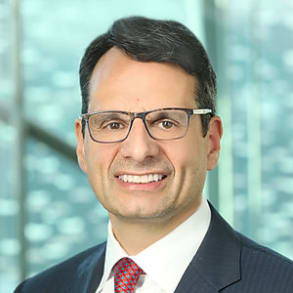Members of the general pediatric surgery team at Johns Hopkins Children’s Center are leaders in their specialty and are performing surgical procedures on patients with various complex conditions. David Hackam, surgeon-in-chief, discusses the multidisciplinary general pediatric surgical programs.
Hi, my name is David Hack and I'm the Chief of pediatric Surgery here at the Johns Hopkins Children's Center. It's an absolute pleasure to talk to you about some of our outstanding centers of excellence here in pediatric surgery. I'm gonna start with our congenital diaphragmatic hernia program and this like all of the programs I gonna talk to you about today are multidisciplinary, receive patients from around the world and have the best possible outcomes for our precious kids and their families. Our congenital diaphragmatic hernia program takes care of those Children that are born with a congenital diaphragmatic hernia, which is an opening in the diaphragm that allows the intestines to enter up into the chest, creating problems for the child to breathe immediately compounded by a condition called pulmonary hypertension, which prevents blood from reaching the lungs properly. In combination with our fetal therapy colleagues, we've developed techniques to take care of these Children while still in the womb, allowing the lungs to grow and expand so that when they're born, they can be taken care of by our multidisciplinary team that allows these Children to thrive and to really reach their full potential. It's a world class program. And we're very proud of it. At the same time, we're taking insights from the bedside into our laboratories to understand what causes these conditions from developing in the first place. The next program I'd like to highlight is our robotic surgery program. This is also a multidisciplinary program with our pediatric general surgeons and our pediatric urologists that work literally hand in hand in robot to develop outstanding care for Children with complex anomalies of the uh urogenital system, the stomach, the duodenum Children that benefit from robotic surgery. The most are those kids that have conditions for which open surgery would create just a lot of pain. A lot of morbidity and using robotic techniques, we can provide surgery that is more minimally invasive, that provides better views of the operative field and that controls for the uh multiple problems that could happen afterwards with open surgery because of these efforts in combination with uh various different teams. Our robotic surgical program is one of the largest in the Mid Atlantic and actually one of the largest in the country. Now, in terms of volume. The third program I'd like to highlight is our esophageal atresia program. Children that are born without the ability to swallow represents some of the most complicated and challenging babies for us to take care of and require specialized multidisciplinary care. Our team here at the Johns Hopkins Children's Center led by Doctor Sean Kaki has developed novel techniques to take care of Children with esophageal atresia in combination with a condition called tracheoesophageal fistula where the esophagus literally is connected to the windpipe by utilizing minimally invasive as well as open techniques. As well as gaining understandings from the research lab. We've been able to develop a program in esophageal atresia with world class outcomes for our patients. Two other errors that I'd like to highlight. The first is traumatic brain injury. Our city like many cities are facing an epidemic of violence and many of our children's injuries are uh occurring to the brain as well as to other organs. And because of this experience, as well as the teams led by Esam Nasser and colleagues. In combination with our critical care docs, we've developed protocols and techniques to not just develop the best outcomes for these patients but also to prevent these injuries from happening in the first place. And finally, our colorectal program has uh been developed in combination with our pediatric urologists and our pediatric gastroenterologists and takes care of Children with the most challenging colorectal conditions from inflammatory bowel disease, Crohn's and ulcerative colitis to conditions where the anus and anorectal region fail to develop. These Children come to us from around the region. Many for the very first time, others that have had surgery in perhaps less experienced surgeons hands with outcomes that we have been able to optimize these are programs that we're very proud of that we've been able to offer world class care to our patients. And we've been able to present our research at some of the leading conferences around the world. Thank you very much for allowing me to share some of these highlights uh with you today. Thank you.



